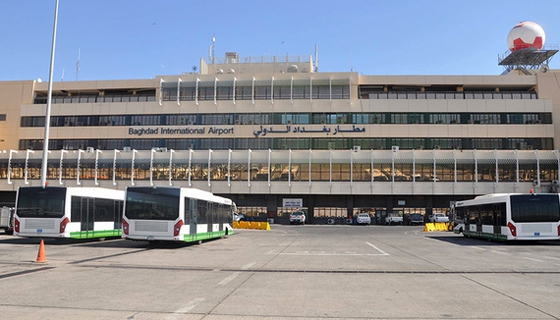Even if it were true that Sumerians built the first airport at Nasiriyah in 5000 BC, as Iraqi Transport Minister Kazem Finjan claimed in October, they would be shocked at the state of Iraqi aviation today. While Kazem said Iraq's early settlers used the airport as a base for exploring space, allegedly even discovering Pluto, Iraqis today would be happy to discover planes at their local airport. The Iraqi Civil Aviation Authority announced April 12 that a number of the country's airports will be rehabilitated, but as critics have pointed out, one small problem remains: There are not enough planes to serve them.
After Iraqi forces invaded Kuwait in August 1990, the international community imposed an air embargo and other sanctions on the country, which were lifted in 2003 after the overthrow of President Saddam Hussein. Provincial and local governments, in an effort to catch up with developments in the global transport sector, sought to establish airports in every city, but with little apparent consideration given to providing the airports with the required equipment, including planes.
The building spree included airports in Erbil and Sulaimaniyah (2005), Najaf (2008) and Dahuk (2012). On March 6, the Dhi Qar airport in Nasiriyah began weekly flights to Baghdad. Meanwhile, other Iraqi cities are also looking to establish air connections.
A year ago, the Babil governorate signed a memorandum of understanding with a French company for an international airport. A cornerstone for an international airport at Karbala was laid in January, and on April 6 another was laid in Kut. On March 12, the Transport Ministry confirmed that it will turn the military airport at Diwaniyah into a civil facility. Mosul's airport is reportedly slated for rehabilitation after the city's liberation from the Islamic State.
Jumaa Diwan, a member of the parliamentary Services Committee, called the number of planned airports “unnecessary.” Diwan told Al-Monitor, “It is useless to have so many airports with [only] a few number of airplanes. This is not to mention that there are no international airlines operating in the country, except for at the Baghdad airport, which anyway only receives airplanes from certain countries.”
When asked what might be behind the push for airports, Diwan cited “the keenness of local governments [promoting] the projects to use them for election propaganda.” He further remarked, “The contracts for rehabilitating the airports involve lots of corruption, as the political parties are raising money for themselves through these contracts.”
On the issue of Iraq having an insufficient number of planes, Samer Kubba, director of Iraqi Airways, told Al-Monitor, “The number of aircraft is not compatible with the number of existing civilian airports. This is due to poor planning by local governments, which thought the conversion of military airports from Saddam's era into civilian ones would be an easy task.”
Kubba said Iraq has a total of 31 commercial passenger aircraft being used full-time. “Over the next two years, Iraq will need more than 20 new aircraft,” he said. “There have already been 40 aircraft signed for with Boeing to meet actual needs for six years. Iraq has received five aircraft so far, but this contract has been temporarily suspended because of financial distress.”
Laith al-Rubaie, spokesman for the Transport Ministry, told Al-Monitor, “The problem has been taken care of temporarily by limiting the number of flights by the internal and external air fleet, which is the case today, and resorting to leasing planes sometimes used by the state in addition to temporarily closing airports in cities and repurposing some to accommodate new functions, such as storage and military tasks.”
Despite these efforts, there is a more effective solution, according to Rubaie. He asserted, “[We need to encourage other airlines to come to Iraq, persuading them to increase their flights to Iraqi cities, especially the holy ones, so that city airports can be invested in and made financially profitable.”
Tawfiq al-Kaabi, another Services Committee member, told Al-Monitor, “The local governments have been establishing airports, mistakenly thinking that these are easy projects that would bring investment into the provinces, while the reality on the ground is totally different. These airports, which have no air traffic, be it internal or external, remain useless.”
Kaabi said, “The focus should be on the development of infrastructure for other means of transport, such as trains, highways and advanced land transport systems.” He added, “Development works in the coming period will go in this direction.”
Kaabi said that a breakthrough in Iraq's financial crisis would help in implementing some promising transport projects, including rail connections from central provinces to Basra in the south. He added, “There is also a project to establish a metro rail network in Baghdad and [other] major cities.”
Given Iraq's renowned historical sites, the country has the potential to become a desired destination for international tourists and other travelers if properly developed and its monuments preserved, restored and maintained. Religious tourism could also be a big draw given the number of important and ancient religious sites sacred or important to Sunnis and Shiites in addition to biblical Christian sites.
In the meantime, convincing international airlines to fly to Iraq’s existing airports would appear to take priority over establishing new facilities. For now, the number of flights to and from Baghdad remains limited in number and destinations.
Al-Monitor
26 April






















































